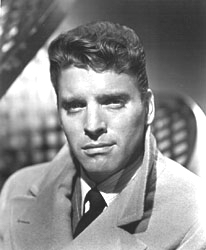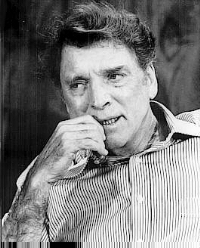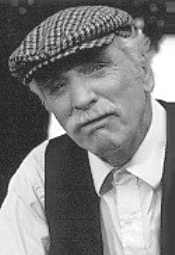 Burt Lancaster was born on November 2, 1913 in New York City where he was one of five children of a postal worker. He grew up on the streets of New York and was known as being a very tough kid. He took an interest in gymnastics at an early age. In 1930, he graduated from DeWitt Clinton High School in New York. At the age of 17 joined a circus troupe, forming a duo with the diminutive performer Nick Cravat (later to frequently serve as his onscreen sidekick) until an injury forced him to give up the profession. For a time Lancaster attended New York University and in 1935 he married June Ernst until their divorce in 1946.
Burt Lancaster was born on November 2, 1913 in New York City where he was one of five children of a postal worker. He grew up on the streets of New York and was known as being a very tough kid. He took an interest in gymnastics at an early age. In 1930, he graduated from DeWitt Clinton High School in New York. At the age of 17 joined a circus troupe, forming a duo with the diminutive performer Nick Cravat (later to frequently serve as his onscreen sidekick) until an injury forced him to give up the profession. For a time Lancaster attended New York University and in 1935 he married June Ernst until their divorce in 1946.
He enlisted in the United States Army during World War II, where he performed in Army shows overseas acting and dancing in a number of armed forces revues for the USO. Lancaster left the Army when he was in his mid-thirties and decided to pursue a dramatic career. He auditioned for a Broadway play and was offered a role, making his debut in A Sound of Hunting. Though the play was not successful, Lancaster's performance drew the attention of a Hollywood agent which led to a contract with Paramount. His first film was the 1946 motion picture The Killers a certified classic of film noir. It remained the genre of choice in several of his subsequent projects, including 1947's Brute Force and I Walk Alone the following year. Lancaster married his second wife, Norma Anderson, on December 28, 1946, and they were married until 1969.
After starring as Barbara Stanwyck's cheating husband in Sorry, Wrong Number (1948), Lancaster and his manager formed their own production company, Hecht-Lancaster, the first notable star-owned venture of its kind. Its formation was a result of Lancaster's conscious effort to avoid "beefcake" roles, instead seeking projects which spotlighted his versatility as a performer. While the company's first effort, the war melodrama Kiss the Blood Off My Hands (1948), was not a success, they were nonetheless able to secure enough financial backing to break off completely from the mainstream Hollywood system. Still, Lancaster also continued to appear in studio productions. In 1949, he reunited with The Killers director Robert Siodmak at Universal for another excellent noir, Criss Cross, followed by Rope of Sand the same year. He also signed a non-exclusive contract with Warner Bros., where he and Hecht produced 1950's The Flame and the Arrow, a swashbuckler which was his first major box-office success.
 After producing Ten Tall Men (1951) with Hecht, Lancaster starred in the biopic Jim Thorpe--All American (1951). With Siodmak again directing, he next headlined the 1952 adventure spoof The Crimson Pirate, followed by Daniel Mann's Come Back, Little Sheba opposite Oscar-winner Shirley Booth. Then, in 1953, Lancaster starred in the Fred Zinnemann classic From Here to Eternity, earning him a Best Actor Oscar nomination and, in his beachside rendezvous with co-star Deborah Kerr, creating one of the most indelible images in film history. Another swashbuckler, His Majesty O'Keefe (1954), followed, and under director Robert Aldrich the actor headlined a pair of Westerns. Finally, in 1955, Lancaster realized a long-held dream and helmed his own film, The Kentuckian. Reviews were negative, however, and he did not return to the director's chair for another two decades.
After producing Ten Tall Men (1951) with Hecht, Lancaster starred in the biopic Jim Thorpe--All American (1951). With Siodmak again directing, he next headlined the 1952 adventure spoof The Crimson Pirate, followed by Daniel Mann's Come Back, Little Sheba opposite Oscar-winner Shirley Booth. Then, in 1953, Lancaster starred in the Fred Zinnemann classic From Here to Eternity, earning him a Best Actor Oscar nomination and, in his beachside rendezvous with co-star Deborah Kerr, creating one of the most indelible images in film history. Another swashbuckler, His Majesty O'Keefe (1954), followed, and under director Robert Aldrich the actor headlined a pair of Westerns. Finally, in 1955, Lancaster realized a long-held dream and helmed his own film, The Kentuckian. Reviews were negative, however, and he did not return to the director's chair for another two decades.
In 1955 Lancaster co-starred with another Oscar winner, Anna Magnani, in The Rose Tattoo. Opposite Tony Curtis, he appeared in the 1956 hit Trapeze, and with Katherine Hepburn, headlined The Rainmaker later that same year. Gunfight at the O.K. Corral, a blockbuster featuring Lancaster as Wyatt Earp, followed in 1957, as did the acclaimed The Sweet Smell of Success. For 1960's Elmer Gantry, he won an Academy Award for his superb portrayal of the title character, a disreputable evangelist, and a year later co-starred in Judgment at Nuremberg. Under John Frankenheimer, Lancaster next portrayed The Birdman of Alcatraz (1962), earning Best Actor honors at the Venice Film Festival for his sympathetic turn as prisoner Robert Stroud, an expert in bird disease.
 During 1963 Italian filmmaker Luchino Visconti was trying to secure financing for his planned historical epic The Leopard, and needed to cast an international superstar in the lead role; Lancaster actively campaigned for the part, and delivered one of the strongest performances of his career. After two hit movies with Frankenheimer, the 1964 political thriller Seven Days in May and the 1965 war drama The Train, Lancaster starred in another Western, The Hallelujah Trail, followed by the 1966 smash The Professionals. By 1970 he was back at the top of the box office with Airport. Still, Lancaster's star was clearly dimming, appearing in a pair of low-budget Westerns. Taking matters into his own hands, he wrote and directed 1974's The Midnight Man in collaboration with Roland Kibbee, but it failed to attract much attention.
During 1963 Italian filmmaker Luchino Visconti was trying to secure financing for his planned historical epic The Leopard, and needed to cast an international superstar in the lead role; Lancaster actively campaigned for the part, and delivered one of the strongest performances of his career. After two hit movies with Frankenheimer, the 1964 political thriller Seven Days in May and the 1965 war drama The Train, Lancaster starred in another Western, The Hallelujah Trail, followed by the 1966 smash The Professionals. By 1970 he was back at the top of the box office with Airport. Still, Lancaster's star was clearly dimming, appearing in a pair of low-budget Westerns. Taking matters into his own hands, he wrote and directed 1974's The Midnight Man in collaboration with Roland Kibbee, but it failed to attract much attention.
For Visconti, Lancaster next starred in 1975's Conversation Piece and remained in Europe to appear in Bernardo Bertollucci's epic 1900. Neither resuscitated his career and Lancaster languished in a number of television projects before appearing in 1978's Go Tell the Spartans, which, despite critical acclaim, failed to catch on. In 1980, however, he delivered a stunning turn as an aging gangster in Louis Malle's excellent Atlantic City, a performance which earned him Best Actor honors from the New York critics as well as another Oscar nomination. Also highly acclaimed was his supporting role in the 1983 Bill Forsyth gem Local Hero. Heart trouble sidelined him for all of 1984, but soon Lancaster was back at full steam, teaming one last time with Kirk Douglas for 1986's Tough Guys. Several more TV projects followed before he returned to feature films with the 1989 blockbuster Field of Dreams. In 1991, Lancaster made his final appearance in the telefilm Separate But Equal, and married his third wife, Susan Martin.
As Lancaster aged, heart trouble increasingly hindered him from working as intensely as his passion and determination demanded. He eventually had to undergo open-heart surgery, and a cerebral stroke in 1990 left him in a wheel-chair, partly paralyzed. At home in Los Angeles on October 20, 1994, Burt Lancaster died of a heart attack at the age of 81. Rugged, athletic, and handsome, Burt Lancaster enjoyed phenomenal success, making over eighty-five films for the big screen as well as for television in a career spanning more than four decades. Boasting an impressively wide range, he delivered thoughtful, sensitive performances across a spectrum of genres from film noir to Westerns to melodrama with a presence and power matched by only a handful of stars.
--THE NOIR 'NET